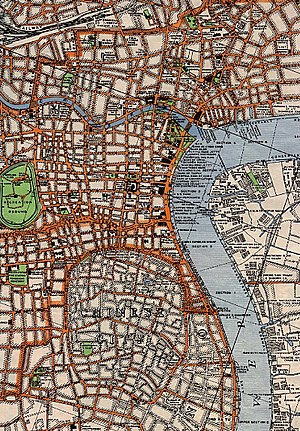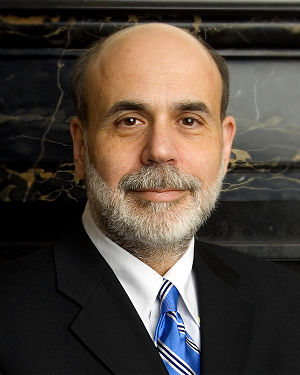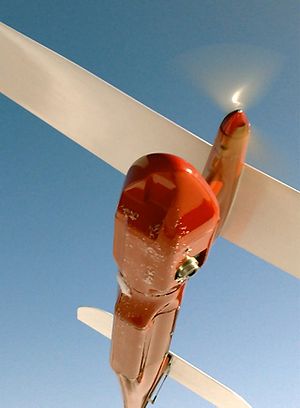December 2010 Newsletter
 William Bao Bean by Fantake via Flickr
William Bao Bean by Fantake via FlickrBecause of upcoming travel in December - the China Speakers Bureau will hold court in Rome, Brussels, Antwerp and Shanghai - updating of the website might drop slightly.

 |
 William Bao Bean by Fantake via Flickr
William Bao Bean by Fantake via Flickr
 Old Shanghai via Wikipedia
Old Shanghai via WikipediaAs to how it was put together – I broke Shanghai down into three areas – the International Settlement, the French Concession and the External Roads Area. I then plotted out blocks across t€he three areas and retraced every street to compare old and new maps. What this revealed was that there are a lot more roads than commonly listed with old names – several hundred – and that most of the sources you’ll find on the internet are (gasp, shock horror) wrong. Mistakes get made, repeated and repeated again and eventually it’s impossible to tell – I’ve gone back to the original map and tried to start from scratch to avoid those errors. I ventured out far into Yangtzsepoo (Yangpu) to the East, the Badlands of the West, the Trenches of the North and old creeks of the South.Commercial
 Paul French by Fantake via Flickr
Paul French by Fantake via Flickr
Labels: China, China Speakers Bureau, Paul French, Shanghai
 Kaiser Kuo by Fantake via Flickr
Kaiser Kuo by Fantake via Flickr
 Image via Wikipedia
Image via WikipediaThe China Aviation Industry Corp. (AVIC) displayed a model of the new Pterodactyl I UAV. Similar in configuration to as the U.S.-built Raptor, the model was equipped with an unidentified air-to-ground missile under each wing. The 9nine-meter-long UAV has a wingspan of 13 meters and a fuselage width of 1 meter. Performance capabilities include a range of 4,000 kilometers, an endurance of 20 hours, maximum speed of 280 kilometers per hour and a maximum altitude of 5,000 meters. It was also outfitted with a sensor turret under the nose.
AVIC also displayed a model of the TL-8 training drone capable of simulating second- and third-generation fighter aircraft and cruise missiles. According to an AVIC brochure, the drone can operate at 0.85 Mach with a maximum flight time of 40 minutes.More about the other companies at Defense News.
The company also displayed models of two short-range fixed winged reconnaissance UAVs - Night Eagle and SW-1. Both have an operational flight time of three hours. AVIC also provided information on the new ducted-fan Whirlwind Scout. Capable of vertical takeoff and landing, the Scout has a 20-40 minute operational endurance.
 Wendell Minnick by Fantake via Flickr Wendell Minnick by Fantake via Flickr |

Labels: China, China Speakers Bureau, military, UAV, Wendell Minnick
Despite having lived in the USA for 8 years now, on any given day I am likely to be wearing something purchased on my last trip to Shanghai or Beijing. Quite frankly, the clothes in America are Really Really Boring. If I, as an American, find Gap clothes boring, what will the consumers who have grown up in a place like Shanghai think? Where’s the bling, the prints and colors, the fabrics that move, and patterns that pop?More on Gap's hope and fear in China at the China Business Network.
Gap, here’s hoping your people on the ground see the markets in Shanghai and Beijing as a challenge to Gap’s design, branding, operations, and most of all, HR and organizational mettle. Because “cornerstone” sounds altogether too corporate a term to describe what will need to be an all out war for share in the world’s toughest fashion retail market.

Labels: China, China Speakers Bureau, fashion, Gap, Janet Carmosky
 Helen Wang by Fantake via Flickr
Helen Wang by Fantake via FlickrSince “middle class” is a Western concept, to a certain degree, it contains mythical elements for many Chinese. For example, they think middle class Westerners all own homes, drive cars, and travel for vacations. In addition, Chinese believe middle class people should have good manners and a tasteful lifestyle. They do not consider less-skilled professions such as waiting tables as middle class. In China, rural migrants who earn very low salaries mostly fill those jobs.
In The Chinese Dream, I use a combination of these definitions: urban professionals and entrepreneurs from all walks of life, who have college degrees and earn an annual income from $10,000 to $60,000. Over three hundred million people, or about 25 percent of China’s population, met these criteria in 2010.
Please let me know whether you agree with these criteria. How would you define it?More in Forbes.

Labels: China, China Speakers Bureau, economy, Helen Wang, middle class
 Shaun Rein by Fantake via Flickr
Shaun Rein by Fantake via FlickrA mania about China has gripped too many investors. Anything with China in its name gets hot in the way dot-com got people's blood pulsing in the 1990s. Many of America's biggest-gaining initial public offerings this year have been of Chinese firms. Many of those companies deserve high valuations, but not all of them.
Soon two Chinese online video companies, Tudou and Youku, will be going public. Both are run by intelligent, savvy and aggressive management teams that have raised more than $100 million in private equity money. I have friends involved with both companies who will probably be very angry at me for writing this, so I do not say it lightly, but investors need to be very cautious about investing in these companies and understand the risks.Shaun Rein has serious misgivings about the business models of both loss making companies who pin their hopes on the 420 million internet users in China.
Searching for profits, both Tudou and Youkou have moved into generating more content rather than relying on user-generated content, and they have clamped down on pirated shows. A Hulu-style site might make money more easily than one with user-created content, but the cost of creating content is huge. Tudou and Youkou are not television stations; Hulu's backers, like Newscorp and ABC, can simply broadcast their television content online. Creating content and developing a cool website take totally different management skills. Content, like the movie business, is a risky bet, because it is dependent on one-hit wonders.More arguments in Forbes.

 Ben Bernanke via Wikipedia
Ben Bernanke via WikipediaGlobal investors are rightly worried that with the U.S. money supply growing the value of the dollar will continue to drop. So what are they doing? Companies like Apple, General Electric and Pepsi are investing in emerging markets like Brazil, India and China that are rebounding better from the crisis. The result is massive asset bubbles in those places that could create great volatility if they popped.
In other words, Bernanke is unleashing America's economic woes and bubbles on the rest of the world. America's closest allies like Germany and Brazil are protesting, sensibly, as are the Chinese. They don't want Bernanke to fob off America's problems onto them.More in Forbes
 Shaun Rein by Fantake via Flickr Shaun Rein by Fantake via Flickr |

Labels: Bernanke, Brazil, China Speakers Bureau, Fed, Germany. China, Shaun Rein
 Shaun Rein by Fantake via Flickr
Shaun Rein by Fantake via Flickr
Labels: China, China Speakers Bureau, economy, inflation, Shaun Rein

Labels: China, China Speakers Bureau, Helen Wang, middle class
 CEIBS in Shanghai via Wikipedia
CEIBS in Shanghai via WikipediaJust as a ship needs to slow down in order to repair its engines, our economy needs to slow down if it wants to tackle structural problems which endanger future growth."
There are different economic engines, like exports, investments and consumption. "The vital engine of consumption, however, is not working in China. If we delay repair the other two will stop at the same time. Not a single country can sustain growth when its economy keeps growing with double- digits."More than 50 Chinese companies have now entered the Fortune-500 list, but that is not necessarily good news, the economist says:
"That doesn't mean they are productive", says Wang. "They have had access to unlimited amounts of cheap money. The interest rate for them has been lower than inflation. They keep on investing up to the point of serious overcapacity, which has a negative effect on both the returns and the prices. In other words, they waste people's money."
Big profits without adding value and creating jobs is a bad strategy for a country that urgently needs more consumer spending, says Wang. "Labour income as a share of gross domestic product has been declining for years. Instead of supporting capital-intensive industries, we need small and medium enterprises, in order to create labour-intensive jobs, up the value chain. We have the world's largest market for luxury cars, but at the same time too many people earn just the minimum wage."More at IPS News.
 by Fantake via Flickr by Fantake via Flickr |
| Wang Jianmao |

Labels: CEIBS, China, China Speakers Bureau, economy, Wang Jianmao
 Shaun Rein by Fantake via Flickr
Shaun Rein by Fantake via FlickrI fretted not only about paying salaries but that I might have to close if things didn't get better. After slaving for three years building up my firm, the China Market Research Group, positioned as higher than McKinsey in price and quality for strategy projects focused on China, I feared losing it all.
I sat down with my wife at Starbucks to figure out what to do. She asked if I thought China's economy would be strong in five years. I said yes. Then she said, "Go out, and hire more top people, and build the brand. If we personally need to sacrifice, so be it." With that, we launched our plan.Shaun Rein's company recovered in 2010 and he advises what he did: continue marketing, continue hiring. More in Forbes.

Labels: China, China Speakers Bureau, consulting, crisis, Shaun Rein
 Xi Jinping via Wikipedia
Xi Jinping via WikipediaWith bilateral trade reaching more than R110 billion last year, China is now South Africa's biggest trading partner and its most lucrative export destination. China's ICBC bank is South Africa's largest foreign investor ever, with a 20% stake in Standard Bank that it bought for R36.67 billion in 2008. Naspers is the most successful foreign investor in China's media and internet sector, with a 35.2% stake in Tencent, China's largest internet company with annual revenues in excess of R13 billion. SABMiller is the most successful foreign investor in China's beer market, with a 49% stake in China Resources brewery, which controls about 20% of the country's R300 billion beer market.After painting the importance of Xi Jinping's visit, he summarizes the media attention this VIP visitor got. A raging Jeremy Goldkorn:
But you wouldn’t know it from South Africa's news media. China has been absent from the front pages of the newspapers in the last few days. It's no better online.
IOL homepage: no mention of Xi's visit or China, although if you dig around you can find a recycled piece of Reuters copy headlined China’s Xi in SA for minerals. TimesLive homepage: no mention of Xi's visit or China, although if you dig around, you can find this story: Chinese company might bail out Aurora. As if to underscore how little the editors know or care about China, there is no contextualisation of this story with Xi Jinping's visit to South Africa, or Zuma's visit with a business delegation in August. News24 homepage: A small and hard-to-find link to a Reuters piece on Xi's visit. M&G online homepage: no mention of China. The Daily Maverick: No mention of Xi's visit, but if you look closer there is an article about US-China relations.
Kevin Bloom, who is apparently writing a book about China's growing role in Africa, has even been silent on Xi’s visit. There does not seem to be a single South African journalist or editor who even cares. While a major, epoch-changing story develops, the South African media sleeps, or frets about the proposed media appeals tribunal or Julius Malema's latest utterance.
Time for South African media to wake up and smell the tea.Commercial

Labels: China, China Speakers Bureau, Jeremy Goldkorn, Xi Jinping
 Kaiser Kuo in 2008 via Wikipedia
Kaiser Kuo in 2008 via Wikipedia
Labels: Annette Nijs, Arthur Kroeber, Kaiser Kuo, Paul French, Rupert Hoogewerf, Shaun Rein, Wen Jiabao, William Bao Bean, William Overholt
 The wrong helicopter via Wikipedia
The wrong helicopter via Wikipedia"Taiwan has a high mountainous interior with low salty coastlands. Neither are friendly to Apaches," said Wendell Minnick, Asia bureau chief for Defense News, in an interview with Asia Times Online. "Taiwan wanted Apaches largely because they are the latest, most technologically advanced piece of equipment in the US arsenal, but it's the Cobras, which are popular with the US Marine Corps, that can handle the types of environments found in Taiwan with ease."
The AH-1W Super Cobras Minnick recommends are the backbone of the US Marine Corps' attack helicopter fleet. Over the next decade, they will be replaced by the AH-1Z Viper upgrade, which is widely called "Zulu Cobra" in reference to its variant letter. The marines placed orders for more than 400 AH-1Zs, and one of the things that makes the Zulu Cobra especially suitable for a military that fights in proximity of seashores is that its rotor blades come with a semi-automatic folding design, which allows the helicopter to be stored aboard amphibious assault ships. The Longbow radar that gives the AH-64D Apache Longbow its name can also be mounted, along with the same missiles and rockets as the Apache.
Neither from a military nor an economic point of view does Minnick see why Taiwan would choose the Apaches over the Cobras. "Taiwan already has two squadrons of AH-1W Super Cobra attack helicopters. It was given an option to procure 30 new Zulu Cobras and was offered an upgrade of their older Super Cobras up to Zulu standards. That would have given them 90 AH-1Z heavy attack helicopters in their inventory. But instead they chose Apaches."Commercial

Labels: Apache, China, China Speakers Bureau, Cobra, Taiwan, Wendell Minnick
 Image by Breff via Flickr
Image by Breff via FlickrAs much as I respect Suu Kyi (and I respect her a lot), I feel certain that she needs to go beyond reconciliation and rethink her strategy of pushing the Western world to implement stringent economic sanctions against Myanmar. She should be promoting active economic engagement instead.
Economic sanctions do not cause the downfall of unsavory regimes. They only further impoverish ordinary people who live in terror and hardship. In fact, sanctions bolster regimes, as they concentrate power more tightly among elite families, who become more insecure and heavy-handed in their attempts to annihilate opposition as they grow to fear for their lives. They starve common people while doling out benefits to a select few thugs....Engaging China has been a much smarter move compared to isolating it, Shaun Rein argues:
Unless you are a fool or a knee-jerk ideologue, you can't argue that the quality of life of most Chinese isn't far better now than just a decade ago. In 2000 it was difficult for Chinese to move freely within the country. This year 52 million Chinese traveled abroad. They are the biggest per-capita foreign spenders in France...
Active engagement and economic ties helped bring about China's reforms, and they continue to improve life for ordinary Chinese. Aung San Suu Kyi should learn from China's experience with reform. Active engagement is a proven model for bettering people's lives. Economic sanctions are a failed policy.Much more in Forbes.
 Shaun Rein Fantake via Flickr Shaun Rein Fantake via Flickr |

Labels: Aung San Suu Kyi, China, China Speakers Bureau, Shaun Rein
 Image via Wikipedia
Image via WikipediaThree Chinese companies - ASN Technology Group, China Aerospace Science and Industry Corp. (CASIC), and China Aerospace Science and Technology Corp. (CASC) produced most of the UAVs on display.
ASN Technology is the largest UAV production company in China, with a history of developing unmanned aerial platforms, including drones, since 1958, said a company press release. The primary customer is the Chinese military and the company controls more than 90 percent of the UAV market in China.
A company spokesperson said ASN works closely with the Northwestern Polytechnical University's UAV Institute.
ASN showed off 10 different UAVs, including the new ASN-211 Flapping Wing Aircraft System, which simulates a bird in flight. The prototype on display has a take-off weight of only 220 grams with a maximum speed of six-to-10 meters a second and an altitude ranging from 20-200 meters. A spokesperson said the micro-UAV would mainly be used for low-altitude reconnaissance for troops in the field.More details at Defense News.
 Wendell Minnick Fantake via Flickr Wendell Minnick Fantake via Flickr |

Labels: air force, China, China Speakers Bureau, military, UAV, Wendell Minnick, Zhuhai
 via CrunchBase
via CrunchBaseKaiser Kuo, the director of international communications for Baidu, said that it was wrong to suggest that China’s controls on the Internet were unfairly helping his company.
“Google no longer incurs the costs of censorship that we continue to incur; those costs include not only hardware, software and manpower but most importantly the time of our very senior managers,” Mr. Kuo said. “We should not labor under the illusion that censorship is some sort of competitive advantage to Baidu.More in the New York Times on Google's accusation China's internet controls are against the WTO rules on internet access.

Labels: Baidu, China, China Speakers Bureau, Google, internet, Kaiser Kuo
 Howard French by Fantake via Flickr
Howard French by Fantake via FlickrGiven the size of China’s online audience, which is roughly 400 million and still rising fast, Han Han could also be the world’s most popular blogger—his 425 million cumulative hits place him at the top of Sina.com’s rankings....
Beijing has played a complicated hand in the matter, ardently fanning the embers of nationalism in the state-controlled press, while carefully censoring Internet discussion of the issue with an eye toward preventing big demonstrations in the streets and other mass mobilization, which the state fears could get out of control.
With the crisis with Japan deepening, Han Han mercilessly probed the contradictions in the government’s position while warning his followers of the dangers of manipulation by the state. “In my opinion, if everyone and everything is doing well, life is as one wishes, the wife, kids, home, car, work, leisure, health, all are okay, one can, under the guise of national sentiment, go and make a fuss about protecting the Diaoyu Islands. But if you have something of your own that you haven’t protected, first protect that and then we can talk. Don’t worry about something so far off.”
To those who decide to protest anyway, he continued: “Don’t be surprised when after the battle, you, mortally injured, see the leaders and the invaders [the Japanese] cheerfully discussing a big business deal.”Howard French quotes many other observers, whose opinions on the direction China is taking vary a lot. But he ends with a fairly positive note:
Democracy may be too big a short- or even medium-term expectation for China, even with its burgeoning Internet culture. But from my perspective as a longtime observer of this country, if China’s civil society is the key factor in the country’s evolution toward a future in which the Communist Party must accept greater limits to its power, the Internet is this evolution’s beating heart.Much more in the Columbia Journalism Review.

Labels: China, China Speakers Bureau, civil society, Han Han, Howard French, internet, journalism